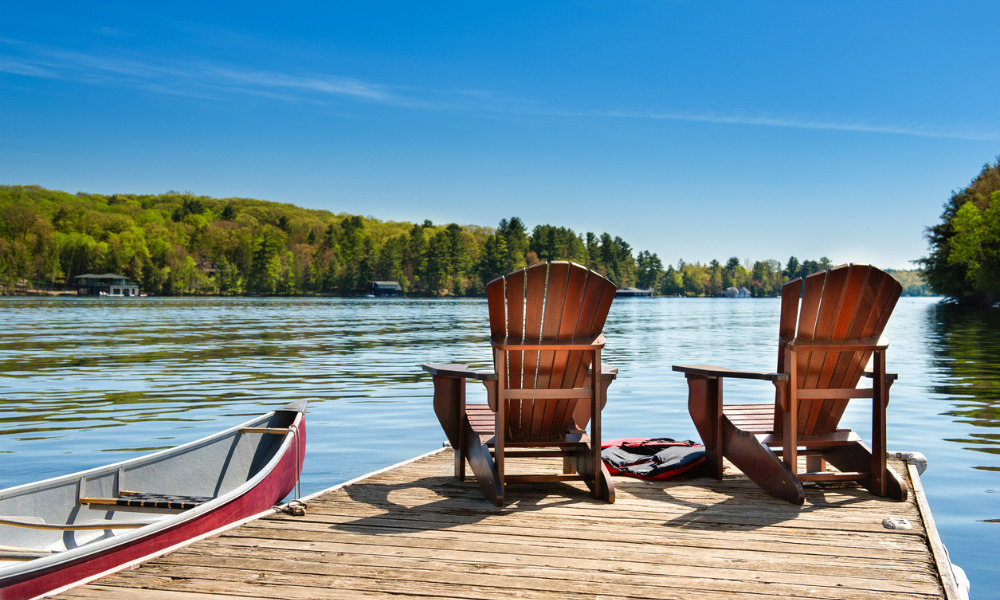Permanent life policies could be effective tax and estate planning tools, says insurance industry leader

For many families across Canada, cottages are at the heart of the summer experience – and that’s become increasingly expensive.
According to figures from Royal LePage, the aggregate price of a single-family waterfront property rose 9.5% year-over-year in 2022 to reach $736,900. Granted, the company expects the aggregate price of single-family homes to decrease modestly this year as economic uncertainty drives down demand, the fact remains that single-family homes would still be more than 32% above 2020 levels.
Against the current broad backdrop of scorching-hot housing markets, cottage ownership – and the associated costs and considerations – might seem like it’s only for the ultra-wealthy. But that’s not necessarily the case.
“Although cottages can be very expensive, depending on where you are and what region you may want to buy one, many families have had cottages in their families for generations,” says Michael Aziz, chief distribution officer at Canada Protection Plan & Foresters Financial Canada. “It’s a high priority for these families to pass that cottage on to either the next generation or to their grandchildren.”
Pains from capital gains
A 2019 survey by RE/MAX found nearly two thirds (64%) of Canadians enjoy recreational properties as places to relax and spend time with friends and family, and 58% prize them as getaway homes. With so many fond memories formed at cottages, Aziz says the question of how to keep them in the family, either by passing them on to children or grandchildren, is a high priority.
For cottage-owning families, the possible tax implications of passing it on can be overwhelming. A cottage bought decades ago will have increased in value, due to rising markets as well as possible investments to upgrade the property over the year. If the original owners choose to sell the property to the next generation while they’re still alive, they may have to pay taxes on those capital gains.
According to Robert Coruzzi, regional vice president at Meridian Credit Union, families who want to transition their cottages to family members may consider doing so via a living trust.
“Utilizing a living trust could help parents who currently own the cottage avoid some tax consequences down the road,” Coruzzi told Wealth Professional in a recent interview.
Another option to help deal with the tax consequences of cottage succession, Aziz says, is via life insurance. By taking out a life insurance policy, he says, the family could use the death benefit to at least help pay for any capital gains tax owing on the cottage.
“If one spouse dies, the cottage will be passed on to the living spouse without triggering a taxable event. So it could make sense to get a joint last-to-die policy,” he says. “The couple could buy the policy, and the children could pay the premiums on it.”
Participating life insurance could also make sense for cottage planning, Aziz says. Because participating policies have the potential to increase in value over time, they can help defray increases in capital gains tax liabilities that accrue over time and may come due in the future.
Equalizing the estate
When planning for cottage succession, it’s also important to consider the children’s ability and willingness to take ownership. According to the 2023 Cottage Trends Report from RE/MAX, only 57% of those that will inherit a cottage are confident in their ability to take on the affiliated costs.
“You might have kids that want to take on the cottage, but they can’t afford it,” Coruzzi says. “That’s a totally different conversation from having two kids, and one being able to afford the expenses while the other can’t.”
Some prospective inheritors of cottages, Aziz says, may decline due to their personal wishes, moving to another province, or a whole host of other life changes. In those situations, Aziz says, life insurance can also be a useful estate planning tool.
“Cottage-owning couples may buy life insurance to equitably distribute their assets,” he says. “The child who wants the cottage would get it, while the other child can get a life insurance payout with similar or equal value to the cottage.”
In using life insurance for estate and cottage succession planning, Aziz says time is of the essence. Aside from becoming more expensive with age, he says coverage becomes harder to obtain as people’s health deteriorates.
“In many cases, people who have had health conditions like diabetes or cardiac issues aren’t able to get life insurance. Some companies like ours provide coverage options so they could still get the insurance to help protect the cottage,” he says. “But the earlier you can have a conversation around cottage succession and possibly using life insurance for that, the better.”



